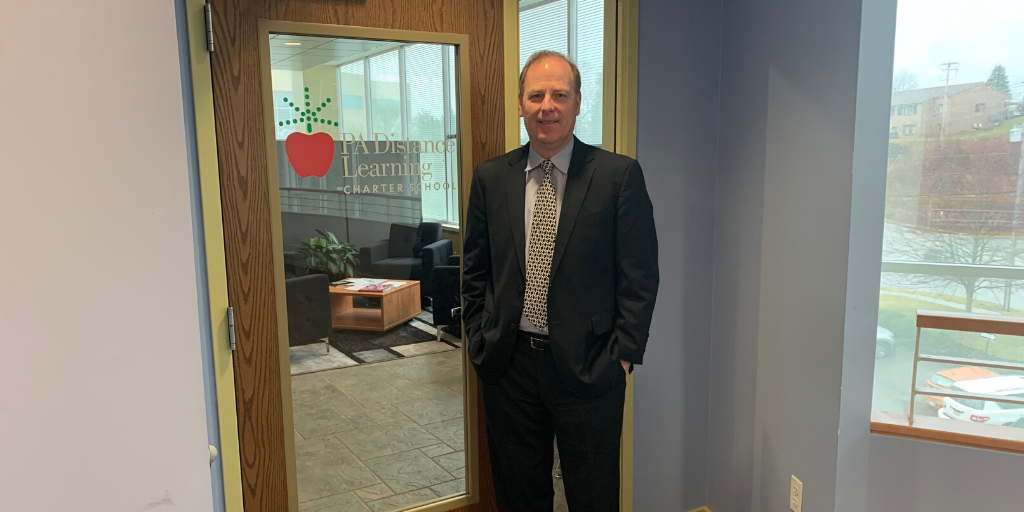
The PA Distance Board of Trustees may be lesser known than the administration, teachers, and support staff within the school family, but that doesn’t mean they aren’t as committed. The Board, made of local community leaders dedicated to creating an exceptional learning environment for students, acts as an oversight committee for PA Distance’s business processes, strategic plans, financials, administration, and everything in-between.
President Mr. John Marous, Vice President, Mr. William Donahue, and Trustee, Mr. Greg Dolan, all have unique backgrounds and experiences that led them to their position on the PA Distance Board of Trustees. While their positions are all unpaid, the Board is committed to serving the Pennsylvania educational community in which they live and work.
Mr. John Marous maintains that the Board’s purpose is to guide and approve strategies, policies, and administrative decisions to maintain and improve life at PA Distance for the students, families, and staff. The Board has operated by leaning on proven administrators and professional educators who have experienced distance learning success.
“The teachers are the experts in this field,“ he explained. “It’s important for us [the Board] to operate humbly without feeling like we have the answer all the time,” he said.
“We try hard to ask hard questions and take positions to see all sides of an issue,” he added. “We have to be unemotional and look at each item from 360 degrees to come to a concrete conclusion that has the best possible outcome for everyone.”
As an active parent in his six children’s academic and extracurricular lives growing up, Mr. Marous has always been a champion for the K-12 educational community. Through a series of volunteer opportunities in the mid-1990s, Mr. Marous became involved in overseeing a new type of educational model introduced: blended electronic learning.
The model is based around the idea that the teacher would teach their students directly for a part of a class. For the second part of the class, students would work independently, using a computer at their own pace. At the time, being in the mid-1990s, this was a new concept that Mr. Marous had found to be successful in the schools that had tried it out first.
“Students had the opportunity to learn at their own pace and to help each other learn in their own environments,” he explained. “That curriculum turned out to be the exact curriculum that cyber schools in Pennsylvania began using in the early 2000s.”
In 2001, through a new board position, Mr. Marous brought this new concept to a cyber charter school that opened in 2004, called PA Distance Learning Charter School. At the time, the school was operated by an educational management company before officially parting in 2012.
A computer-chip engineer by background, Mr. Marous is comfortable in problem-solving, leading a team, and applying an analytical way of thinking. As he brings these skills to the table as the President of the Board of Trustees, Mr. Marous’s primary focus is a “confluence of strategy” for PA Distance’s overall goals and future.
When it comes down to it, Mr. Marous describes three positions that PA Distance must understand: distance learning plays a vital role today, excellence in teaching has to be front and center, and innovation isn’t an option; it’s necessary.
“We want to be that combination of excellence in teaching and new technology tools and innovative at that,” he said.
But what does Mr. Marous define as success for PA Distance?
“By analyzing our organization and asking if we are operating the way we need to reach our long term goals of enabling and assisting and supporting student growth,” he said. “That defines our success.”
To help gauge this effort, the Board and the Administration decided to implement an assessment, including standard tests and aided by additional testing systems brought in-house, in Reading, Science, Math, and Language Arts. By testing each student using Scantron, in multiple subject areas, at various times throughout the year, PA Distance administration, teachers, and staff can help gauge each student’s year-over-year and in-year improvement. The goal is to provide evidence that our educational plan is working for all students, regardless of their grade level or proficiency, and to provide feedback to guide revisions to the educational program.
“We owe it to students to give them the best tools and the best support, but while measuring year-over-year growth. We want to make sure that we are of service to the community,” he explained, “If we have year-over-year academic growth for students, then I believe that we are,” he said.
“We strive to show that innovation and efficiency in education can happen and happen at PA Distance. At the core of that is excellence in teaching,” he explained. “Left to its own devices, organizations in our world today can tend to stagnate rather than innovate. But when you have energetic people who are actively directed to look for better ways, innovation is there.”
“The rest of the world is innovating and looking for ways to be more productive, why can’t we as a team of educators?” he noted. “In the end, each student deserves the best that we can give them.”
Mr. Marous also strives for a neutral decision-making environment where board members make their best judgment for PA Distance families’ well-being. There are many perspectives today in the educational world, and many decisions can be analyzed from different directions. Not all professionals agree on the strategies and tactics to be successful, especially in our newer learning world.
“Our attitude is of helping education thrive through our educational program, leaving the staff flexibility to accomplish within their style, but without delivering personal or political opinions,” he said. “If our teachers, staff, and students can communicate and respect other positions, that’s when we improve and flourish.”
“We are often asking, are we hearing from all of the teachers? Are we using their knowledge and applying it?” he added. After we try to consider all perspectives, we need to define a program and stick to it as a team, which can be challenging.
Most of all, Mr. Marous is motivated by a sense of moral responsibility in his role as the President of the PA Distance Board of Trustees.
“It’s our job that when we leave this world, we leave it in a better place than those before us,” he explained.
“When I leave this world, I want to have been able to do some part to make things better,” he said. “I want to be content that I did enough.”
“Our job is about doing the right things, providing the right support, making the right decisions, and hiring the right teachers so that parents want to send their students to our school,” he said.
But, what does the future hold for PA Distance? One word comes to Mr. Marous’ mind: personalization.
“I think we are going to move closer and closer to individual learning programs and demonstrate, within our teaching model, that every student is different,” he explained. “Our next step is finding out how we can efficiently support each student using various teaching tools and methods.”
With the Board’s guidance and support, PA Distance has a bright future ahead as the country recognizes the importance of distance learning. Through innovation, excellence in teaching, and teamwork, Mr. Marous hopes that PA Distance’s administration, teachers, and staff will continue to pave the way for their next chapter and the next generation of online learners.
“We want to provide an environment that gives innovators the freedom to create and grow while focusing on our students,” he said. “The only way to innovate is to give the keys to the people on the front lines: our teachers.”


